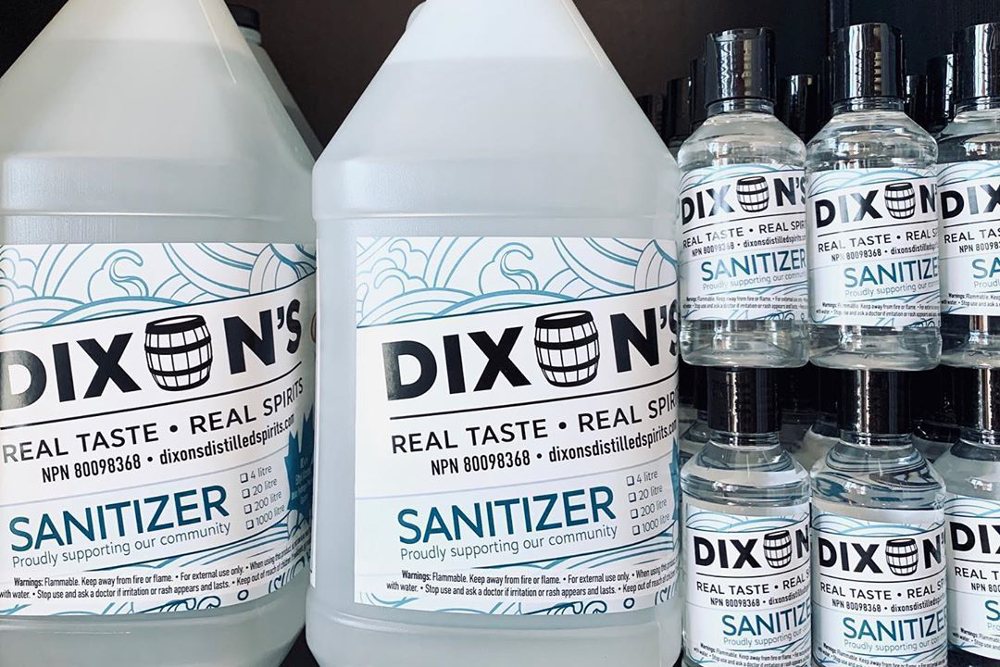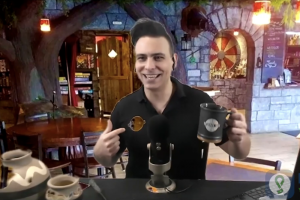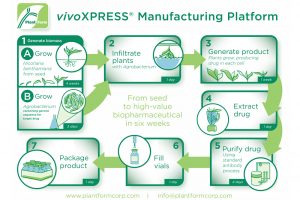01:18 – Why Dixon’s pivoted to produce sanitizer
03:03 – What it takes for a distiller to create sanitizer
04:37 – From hospitals to first responders to businesses
05:32 – THIS number will astound you! And there were many challenges to get there.
08:43 – Future production plans
10:29 – Where to pick up Dixon’s sanitizer
Click the “Connect” tab to browse web/social links …
Website: dixonsdistilledspirits.com
Facebook: @DixonDistilledSpirits
Instagram: @dixonsdistilledspirits
Twitter: @dixon_spirits
Jason Bavington (00:02):
Hi everyone. It’s Jason with DUX — Your Local City Guide and welcome to our first in-person live on-set video blog. I’m very, very excited to be at Dixon’s Distillers here today in Guelph Ontario. Dixon’s has been doing some really, really amazing work during the current Covid crisis. As you know, a lot of distilleries all over the province, all over the country, all over the world have been doing things a bit different. Instead of in addition to, say, cranking out gin and vodka and rye, they pivoted in a way that really, really helps support the community, contribute to the community, give back to the community in a way that’s extremely important. Especially for frontline workers and everyone that has to deal with the challenges of Covid, not only on a day-to-day basis, but then back home in there every day.
Jason Bavington (00:52):
So today I’m here and I’m joined with Chevy and Gabby from Dixon’s Distillers and we wanted to come on out and talk to you guys today. We know you guys have been doing a lot of great work in the sanitizer department and just wanted to find out a little bit more about how you got that whole ball rolling. How you, you know, dealt with any challenges that you had, any problems and just what your experience has been today. So maybe if you want to start off with telling us how the sanitizer came to be, like how it ends
Chevy (01:23):
up in those little bottles. Well, I guess it started probably six / seven weeks ago when this essentially started. JD and I had a conversation and we had a feeling that there was probably going to be a shortage of sanitizer at some point. We had heard meanderings about it. We had discussed, you know, what’s it going to take for us to retool and start producing. So the nice thing about sanitizer for us is it’s mostly alcohol. That’s convenient. We make alcohol. So we actually retooled in about 36 hours. Started making our first recipes with the help of a wonderful gentleman named Dr. Scott Weese from the University of Guelph. He’s the head of infectious disease on the animal side of the veterinarian side. He was an integral part of definitely our first recipes and meeting the WHO standard and Health Canada as well.
Chevy (02:19):
And we started pumping it out. I think it was the second day we started doing it, we had The Guelph Trib[une] came in and did an interview with myself. And the CBC and The National picked that interview up and it went across Canada and poor Gabby came in the next morning to around 400 emails in our info email, where normally we’ll get in about maybe eight or 10 a day. There was probably about 400 from people across Canada wanting sanitizer from us cause they couldn’t get any. So there was, and that, that was a clear indicator to us that there was not a Provincial, but a Country, a global nationwide, need for sanitizer. Yeah. So, so you had that need out there and you knew people were asking for it. So Gabby, what were the steps to start to fill that need? How did you go from the idea of sanitizer to distributing bottles?
Gabby (03:12):
It happened really, really fast. So it’s a bit of a blur, I’d say. We just listened really carefully to what people needed. To hospitals. And we follow very closely to the WHO. So we’ve had to change our formula a few times just to make sure that we are the best quality. Exactly what’s made to fight Covid-19 because there’s a difference. Definitely it has to be that 80% alcohol, hydrogen peroxide and the glycerin. Glycerin is nice for your hands, but the other stuff needs to be in there to fight that Covid-19. So we wanted to ensure that what we were making was exactly what everyone needed. But especially those hospitals and the people we don’t think about. Like the food industry, who has to keep producing and all the people that are in place to do that. So that’s where that started.
Gabby (04:01):
We started filling our drums or our totes. Thousand litre totes. And trying to figure out the best way to get it out as quickly as possible. So we came up with a thousand litre totes available, 20 litre drums, 20 litre pails. And 4 litre jugs were later on. And then we did the minis because we heard the cry from the public as well. So we wanted to ease that fear as well and ensure that people felt good about what was going out the door. So that’s how quickly we turned that around and tried to get it out as quickly as possible. The hospitals, first and foremost, and then also so idea of, so obviously we can’t supply an entire hospital with the exact amount that they need, but we’ve had a ton of doctors who run their own small clinics. First responders who have come in for those. EMS. Police.
Gabby (05:01):
That’s also where the spray bottles came into effect, was that they need those for every ambulance, every fire truck, every police car. So they were coming in and we were donating to them. And then that built out. We had a lot of businesses reaching out when that’s where that kind of snowballed out there. And so obviously from the very beginning we’ve said healthcare is our number one priority. No matter what. Then there’s a list and that’s how we went about that. But we’re a very small team in here and we quickly turn that around and made sure that…
Chevy (05:33):
I think today if we were to add the numbers up, I think we would be somewhere in and around the number of 70,000 litres we’ve produced in about six weeks. 70,000 thousand litres. And I think about 20,000 litres of that has all been donated. It’s a pretty crazy number. Yeah. That’s a huge quantity of fluid to both produce and process and then distribute. Tell me a little
Jason Bavington (05:58):
bit about some of the challenges that you face. Either through the production process. And I see you’re laughing. So I imagine there’s probably a few production challenges you faced. And then some of the distribution challenges that you face. As we hear in the news, are there actually enough containers out there for individual self serve hand sanitizers. So tell us a little some of the challenges.
Gabby (06:18):
So I would say one of our biggest challenges is that for hospitals, for example, we want to get as much out as possible. But they can only store. They’re still fire marshals and health codes that they have to abide by. And so we had to source and adapt and that’s where the four litre jugs came in because that’s the only way that they can store the sanitizer safely in four litre jugs. So we kept saying, “just take it in pails, take it in…” And it was easy on our end, but I’m like, “we can get you thousands and thousands of litres” and they’re like, “we can’t.” So then we had to come up with labels and everything to adapt to the four litres. And we did it. And we did it very, very quickly in order for St. Joe’s and St. Mike’s to get their sanitizer, which was amazing.
Gabby (07:04):
And they worked extremely hard on their end as well to make sure that everything went through. But, it was quite the process. And then again, same with those small bottles. We’re on bottle #5. So it’s not seamless. From a marketing perspective, it wouldn’t look beautiful. But I mean, it is what it is and we try our best to get. People really like the spray bottles so they can spray their hands, but sometimes we can only get the flip caps or the twist off caps and it’s what’s available to us. So we try our best to get what we can and people have been very, very understanding and adaptable and trying to find other ways to disperse the best they can as well, which has been pretty cool to hear those kinds of stories, too.
Jason Bavington (07:49):
Yeah, I think you know, it’s no one’s intention to win any marketing awards for this or, you know, any giant social good or citizen of the year. The idea is you’re on the ground, hands-on. Let’s get the sanitizer out there. Whatever kind of bottle we have, let’s fill those bottles because that’s the fundamental reason why you’re doing this in the first place, right? It’s just not another, you know, a new variety of gin. It’s hand sanitizer that everyone needs. So if you can fit it in a bottle, great. If you can manage to fit it in a four litre bottle for those hospitals because they can’t store these giant giant tanks, then that’s he needs to do, right? So whatever you need to do to make it happen. And I celebrate all the work you guys have been doing to make it happen. Because clearly it’s working and you keep working at it. You keep contributing. You keep producing. You didn’t just produce 10,000 litres and stopped, you’re at 70,000 litres of sanitizer. Which is just crazy. So what are your plans going forward? Are you planning on continuing? Where do you see this, your role, in this current Covid crisis? How do you see it continuing in the next, say, four weeks or so? We feel that
Chevy (08:56):
as, you know, there’s the prediction of there’s going to be a second wave with the virus. We feel there’s going to be a second wave of sanitizer needs. So as [Ontario Premier Doug] Ford opens up more businesses, those businesses will have to be prepared and do their due diligence for their employees. Making sure they have a proper PPE. That one of those being sanitizer. So we have a pretty good feeling that we’re going to get thumped here again with a rush on sanitizer needs. We have a, what they call an Emergency License from Health Canada. So we have the abilit., We have an MPN number to produce sanitizer. Just like all the other distilleries do. But once this pandemic is considered over, 30 days after that this license license goes away. We are actually in talks now and we want to reapply and I think we want to make it an actual staple of our business.
Chevy (09:52):
Yeah. Why not? It’s, you know, we’ve become experts in a very short, in six weeks. So why not. Trial by Fire. Exactly, right? So yeah, learn as you go. So we learn really quick, so I think it’s something that we will look into, and keep going. You know, Covid has changed society and hand sanitizer. When this pandemic is finally over, hand sanitizers still won’t go away. People are still going to be walking on thin ice and be very wary of places they go and cleanliness and germs. And so I think it’ll probably become a part of our business going forward happening.
Jason Bavington (10:29):
So if people want to get their hands on some of your hand hand sanitizer, do they go to your website? Do you have social media links? Is that how people normally communicate with you first to try and find out if there’s some available?
Chevy (10:40):
Come here and get it.
Jason Bavington (10:41):
Come here and get it?
Gabby (10:43):
Not always…
Jason Bavington (10:47):
We’ll make sure you guys get brakes.
Gabby (10:49):
Well we also have two social media platforms that we mostly post to. Or we have our Instagram and our Facebook, @DixonDistilledSpirits. And then there is emails from there that you can contact, especially about the bulk orders. Most of the questions for pickup and whatnot is on our website. It’s our normal business hours. Everything, we are trying to do our due diligence. So our cash and bar is all set up outside so people can safely purchase. Tons of space to social distance. And obviously we sanitize our stuff all the time. So it gives you a safe place to shop,
Jason Bavington (11:28):
So a well oiled machine.
Jason Bavington (11:31):
So I’m Jason with DUX — Your Local City Guide here today on site at Dixon’s Distillers. Finding out all the great things they’ve done to contribute, in terms of hand sanitizer to the community. If you’re watching this video anywhere else but on our website, head on over to dux.city. That’s d u x . city. Click on the blog link and you’ll find the posts for Dixon’s Distillers and everything we discussed today. And guys, what we’ll do, we’ll put links on the post to the Dixon’s Distillers website and all of the social media contacts and all the email addresses and anything that we need to share with you guys. So, if you need hand sanitizer and you either live in Guelph or you don’t, you know who to call, who to get in touch with, who to connect with. So Gabby, everyone, thank you very much again. It was a great pleasure to hear what you guys have done and find out a little bit more about what it takes to get hand sanitizer in those little bottles.
Gabby and Chevy (12:22):
Thank you.
Jason Bavington (12:23):
Thanks so much everyone. Take care.
Jason Bavington (12:25):
We’ll talk to you soon. Cheers.






